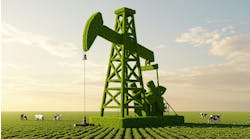Q: Why does diesel fuel have such a range in quality?
A: Fuel production variances in the refining process create different values of cetane, BTU’s, viscosity, specific gravity, heat value, pour point, cloud point, flash point, sulfur and water in diesel fuel. To compensate, additive packages can be administered by the refinery, distributor, or at the terminal to improve fuel quality. The blending of fuels for the particular season is also a common practice which can create a range of quality and changes in additives.
Information provided by: Hot Shot's Secret




